
The National Center for Biotechnology Information (NCBI) is part of the United States National Library of Medicine (NLM), a branch of the National Institutes of Health (NIH). It is approved and funded by the government of the United States. The NCBI is located in Bethesda, Maryland, and was founded in 1988 through legislation sponsored by US Congressman Claude Pepper.

Computational biology refers to the use of data analysis, mathematical modeling and computational simulations to understand biological systems and relationships. An intersection of computer science, biology, and big data, the field also has foundations in applied mathematics, chemistry, and genetics. It differs from biological computing, a subfield of computer engineering which uses bioengineering to build computers.
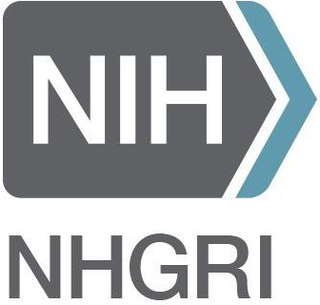
The National Human Genome Research Institute (NHGRI) is an institute of the National Institutes of Health, located in Bethesda, Maryland.
The European Bioinformatics Institute (EMBL-EBI) is an Intergovernmental Organization (IGO) which, as part of the European Molecular Biology Laboratory (EMBL) family, focuses on research and services in bioinformatics. It is located on the Wellcome Genome Campus in Hinxton near Cambridge, and employs over 600 full-time equivalent (FTE) staff. Institute leaders such as Rolf Apweiler, Alex Bateman, Ewan Birney, and Guy Cochrane, an adviser on the National Genomics Data Center Scientific Advisory Board, serve as part of the international research network of the BIG Data Center at the Beijing Institute of Genomics.
Computational genomics refers to the use of computational and statistical analysis to decipher biology from genome sequences and related data, including both DNA and RNA sequence as well as other "post-genomic" data. These, in combination with computational and statistical approaches to understanding the function of the genes and statistical association analysis, this field is also often referred to as Computational and Statistical Genetics/genomics. As such, computational genomics may be regarded as a subset of bioinformatics and computational biology, but with a focus on using whole genomes to understand the principles of how the DNA of a species controls its biology at the molecular level and beyond. With the current abundance of massive biological datasets, computational studies have become one of the most important means to biological discovery.
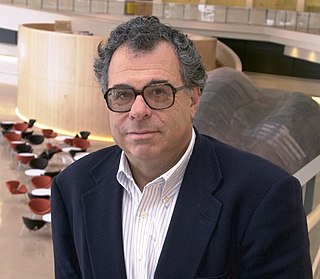
David Botstein is an American biologist serving as the chief scientific officer of Calico. He served as the director of the Lewis-Sigler Institute for Integrative Genomics at Princeton University from 2003 to 2013, where he remains an Anthony B. Evnin Professor of Genomics.

David J. Lipman is an American biologist who from 1989 to 2017 was the director of the National Center for Biotechnology Information (NCBI) at the National Institutes of Health. NCBI is the home of GenBank, the U.S. node of the International Sequence Database Consortium, and PubMed, one of the most heavily used sites in the world for the search and retrieval of biomedical information. Lipman is one of the original authors of the BLAST sequence alignment program, and a respected figure in bioinformatics. In 2017, he left NCBI and became Chief Science Officer at Impossible Foods.
David J. States M.D., Ph.D. is a Professor of Human Genetics at the University of Michigan. His research group is using computational methods to understand the human genome and how it relates to the human proteome. He is the Director of the Michigan NIH Bioinformatics Training Program and a Senior Scientist in the National Center for Integrative Biomedical Informatics.
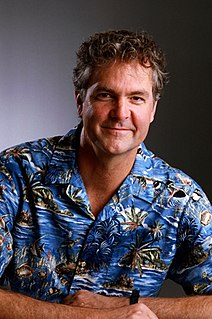
David Haussler is an American bioinformatician known for his work leading the team that assembled the first human genome sequence in the race to complete the Human Genome Project and subsequently for comparative genome analysis that deepens understanding the molecular function and evolution of the genome.
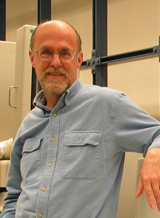
Webb Colby Miller is a professor in the Department of Biology and the Department of Computer Science and Engineering at The Pennsylvania State University.

Takashi Gojobori is a Japanese molecular biologist, Vice-Director of the National Institute of Genetics (NIG) and Distinguished Professor at Center for Information Biology and DNA Data Bank of Japan (DDBJ) in NIG, Mishima, Japan. He has also been co-appointed as the Special Research Consultant of the National Institute of Advanced Industrial Science and Technology (AIST), as a Visiting Professor of Keio University, University of Tokyo, and Tokyo Institute of Technology and as a Visiting Research Director of RIKEN.

Eugene Wimberly "Gene" Myers, Jr. is an American computer scientist and bioinformatician, who is best known for contributing to the early development of the NCBI's BLAST tool for sequence analysis.
Warren Richard Gish is the owner of Advanced Biocomputing LLC. He joined Washington University in St. Louis as a junior faculty member in 1994, and was a Research Associate Professor of Genetics from 2002 to 2007.
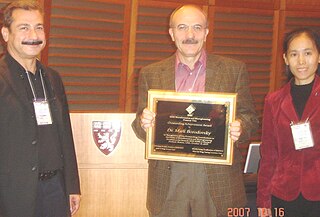
Mark Borodovsky is a Regents' Professor at the Join Wallace H. Coulter Department of Biomedical Engineering of Georgia Institute of Technology and Emory University and Director of the Center for Bioinformatics and Computational Genomics at Georgia Tech. He is also a Chair of the Department of Bioinformatics at the Moscow Institute of Physics and Technology in Moscow, Russia.

Eric D. Green is an American genomics researcher who had significant, start-to-finish involvement in the Human Genome Project. He is the director of the National Human Genome Research Institute (NHGRI) at the National Institutes of Health (NIH), a position he has held since 2009. Green is an ardent St. Louis Cardinals fan.

McDonnell Genome Institute at Washington University in St. Louis, Missouri, is one of three NIH funded large-scale sequencing centers in the United States. Affiliated with Washington University School of Medicine and the Alvin J. Siteman Cancer Center, the McDonnell Genome Institute is creating, testing and implementing new approaches to the study of genomics with the goal of understanding human health and disease, as well as evolution and the biology of other organisms.

George M. Weinstock is an American geneticist and microbiologist on the faculty of The Jackson Laboratory for Genomic Medicine, where he is a professor and the associate director for microbial genomics. Before joining The Jackson Laboratory, he taught at Washington University in St. Louis and served as associate director of The Genome Institute. Previously, Dr. Weinstock was co-director of the Human Genome Sequencing Center (HGSC) at Baylor College of Medicine in Houston, Texas, and Professor of Molecular and Human Genetics there.[1] He received his B.S. degree from the University of Michigan in 1970 and his Ph.D. from the Massachusetts Institute of Technology in 1977. He has spent most of his career taking genomic approaches to study fundamental biological processes.

Gary Stormo is an American geneticist and currently Joseph Erlanger Professor in the Department of Genetics and the Center for Genome Sciences and Systems Biology at Washington University School of Medicine in St Louis. He is considered one of the pioneers of bioinformatics and genomics. His research combines experimental and computational approaches in order to identify and predict regulatory sequences in DNA and RNA, and their contributions to the regulatory networks that control gene expression.
Zengjian Jeffrey Chen is a plant biologist and molecular geneticist, currently the D. J. Sibley Centennial Professor of Plant Molecular Genetics at University of Texas at Austin. Chen received his B.S. at Zhejiang Agricultural University, M.S. at Nanjing Agricultural University, and Ph.D. in Genetics at Texas A&M University. Following a postdoctoral position at University of Minnesota and as an NIH Postdoctoral Fellow at Washington University in St. Louis, he joined the faculty at Texas A&M in 1999, where he was promoted to the rank of Associate Professor with tenure. In 2005, he moved to The University of Texas at Austin and became a Full Professor in 2008 in the Departments of Molecular Biosciences and Integrative Biology, Center for Computational Biology and Bioinformatics, and Institute for Cellular and Molecular Biology.

Mark S. Boguski was an American pathologist specializing in computational analysis and structural biology, He was elected in 2001 to the U.S. National Academy of Medicine, and was a Fellow of the American College of Medical Informatics.

















